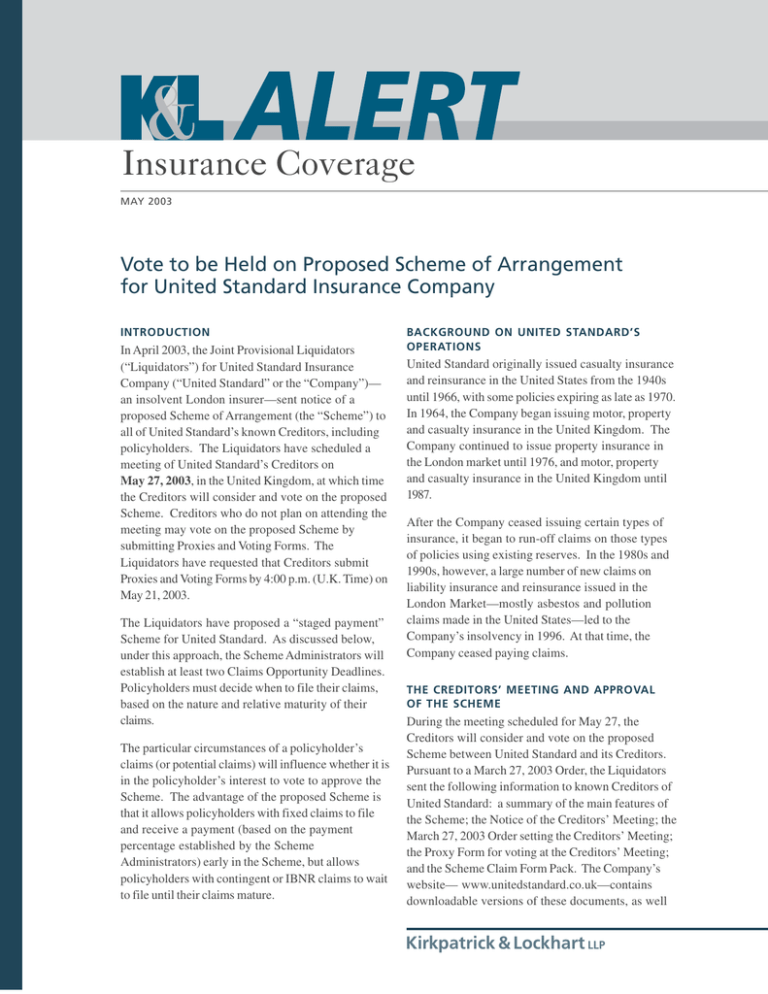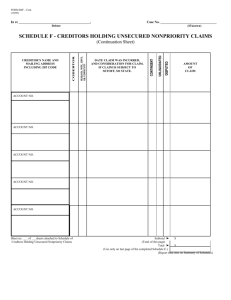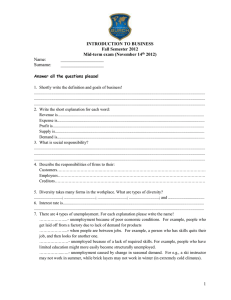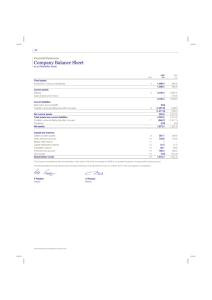
Insurance Coverage
MAY 2003
Vote to be Held on Proposed Scheme of Arrangement
for United Standard Insurance Company
INTRODUCTION
In April 2003, the Joint Provisional Liquidators
(“Liquidators”) for United Standard Insurance
Company (“United Standard” or the “Company”)—
an insolvent London insurer—sent notice of a
proposed Scheme of Arrangement (the “Scheme”) to
all of United Standard’s known Creditors, including
policyholders. The Liquidators have scheduled a
meeting of United Standard’s Creditors on
May 27, 2003, in the United Kingdom, at which time
the Creditors will consider and vote on the proposed
Scheme. Creditors who do not plan on attending the
meeting may vote on the proposed Scheme by
submitting Proxies and Voting Forms. The
Liquidators have requested that Creditors submit
Proxies and Voting Forms by 4:00 p.m. (U.K. Time) on
May 21, 2003.
The Liquidators have proposed a “staged payment”
Scheme for United Standard. As discussed below,
under this approach, the Scheme Administrators will
establish at least two Claims Opportunity Deadlines.
Policyholders must decide when to file their claims,
based on the nature and relative maturity of their
claims.
The particular circumstances of a policyholder’s
claims (or potential claims) will influence whether it is
in the policyholder’s interest to vote to approve the
Scheme. The advantage of the proposed Scheme is
that it allows policyholders with fixed claims to file
and receive a payment (based on the payment
percentage established by the Scheme
Administrators) early in the Scheme, but allows
policyholders with contingent or IBNR claims to wait
to file until their claims mature.
BACKGROUND ON UNITED STANDARD’S
OPERATIONS
United Standard originally issued casualty insurance
and reinsurance in the United States from the 1940s
until 1966, with some policies expiring as late as 1970.
In 1964, the Company began issuing motor, property
and casualty insurance in the United Kingdom. The
Company continued to issue property insurance in
the London market until 1976, and motor, property
and casualty insurance in the United Kingdom until
1987.
After the Company ceased issuing certain types of
insurance, it began to run-off claims on those types
of policies using existing reserves. In the 1980s and
1990s, however, a large number of new claims on
liability insurance and reinsurance issued in the
London Market—mostly asbestos and pollution
claims made in the United States—led to the
Company’s insolvency in 1996. At that time, the
Company ceased paying claims.
THE CREDITORS’ MEETING AND APPROVAL
OF THE SCHEME
During the meeting scheduled for May 27, the
Creditors will consider and vote on the proposed
Scheme between United Standard and its Creditors.
Pursuant to a March 27, 2003 Order, the Liquidators
sent the following information to known Creditors of
United Standard: a summary of the main features of
the Scheme; the Notice of the Creditors’ Meeting; the
March 27, 2003 Order setting the Creditors’ Meeting;
the Proxy Form for voting at the Creditors’ Meeting;
and the Scheme Claim Form Pack. The Company’s
website— www.unitedstandard.co.uk—contains
downloadable versions of these documents, as well
Kirkpatrick & Lockhart LLP
as additional information and documentation relating
to the Scheme and the submission of claims
(including the Scheme document and guidance
notes).
Creditors who do not attend the May 27 meeting
may also vote on the proposed Scheme. The
Liquidators have requested that Creditors submit
Proxies and Voting Forms by 4:00 p.m. (U.K. Time) on
May 21, 2003. It is not clear whether submissions
will be accepted after that time. Faxed copies of the
forms are acceptable.
VOTING CONSIDERATIONS RELATED TO THE
MECHANICS OF THE PROPOSED SCHEME
As stated above, the particular circumstances of a
policyholder’s claims (or potential claims) will
influence whether the policyholder should vote to
approve the proposed “staged payment” Scheme.
Under the proposed Scheme, the Scheme
Administrators will establish at least two (and
potentially more) Claims Opportunity Deadlines.
Creditors must decide whether to submit their claims
prior to the first Claims Opportunity Deadline or to
wait for future deadlines.
The first Claims Opportunity Deadline will be
91 days after the Scheme becomes effective. The
Scheme Administrators will notify Creditors of
subsequent deadlines during the course of the
Scheme. After the Scheme Administrators have
reviewed and approved all of the claims submitted
for a particular Claims Opportunity, they will make a
payment to those Creditors whose agreed claims
were submitted pursuant to that deadline. The
Scheme Administrators will pay to each such
Creditor a certain percentage of their claim. If no
agreement can be reached between a Creditor and
the Scheme Administrators on a particular claim, the
Scheme Administrators will refer the claim to the
Scheme Adjudicator for independent adjudication.
The Scheme Administrators will retain funds during
the course of the Scheme to ensure that all Creditors
receive an equal distribution of the Company’s
assets and to provide for the costs of administering
the Scheme.
Prior to closing the Scheme, the Scheme
Administrators will invite Creditors who have not
already submitted their claims to do so prior to the
Final Claims Opportunity Deadline. If the Scheme
Administrators determine that sufficient funds will
exist after paying out claims, they will declare a
Retention Distribution to be paid pro rata to all
Creditors who have received, or are to receive, a
distribution under the Scheme.
Creditors may only submit their claims once, and
they must submit their own estimate of IBNR
claims. The proposed “staged payment” Scheme is
intended to incorporate the caution of a “reserving”
scheme and the early payment of funds inherent in
an “estimation” scheme. Like an “estimation”
scheme, a policyholder that files a claim during the
first Claims Opportunity may receive a significant
Scheme payment relatively early in the life of the
Scheme. Like a “reserving” scheme, however,
policyholders who file claims during the first Claims
Opportunity will nevertheless have to wait several
years to receive a final Retention Distribution (if any)
from United Standard. Because the Scheme
Administrators must reserve funds to pay Creditors
who wait to file claims until later Claims
Opportunities, they likely will set a conservative
payment percentage after the first Claims
Opportunity.
Creditors, moreover, should be aware that it might be
disadvantageous to file a claim during the first
Claims Opportunity, particularly if all claims (fixed
and contingent or IBNR) must be submitted at the
same time. The Scheme documentation does not
state whether Creditors with both fixed claims and
contingent or IBNR claims will be able to file
different types of claims separately under the
Scheme. If the Scheme does require policyholders to
submit all of their claims at one time, Creditors with
immature contingent or IBNR claims may benefit from
waiting to file all claims during a subsequent Claims
Opportunity, in order to allow more time for such
contingent or IBNR claims to mature.
CONCLUSION
In sum, known Creditors should carefully review the
available information to decide whether to exercise
their right to vote on the proposed Scheme. To
ensure that the Proxy and Voting Forms are accepted,
they should be submitted by May 21, 2003. If the
Scheme is approved, policyholders in general should
determine whether they have claims against United
Standard and, if so, consider the circumstances of
their particular claims and whether it is in their
Kirkpatrick & Lockhart LLP
2
interest to file a claim during the first Claims
Opportunity. For various business reasons, or to
avoid conflicts with reporting requirements, a
policyholder may not be in a position to estimate its
future contingent liabilities or share its internal
projections for such liabilities and, thus, may choose
to wait to file its claims until the second Claims
Opportunity.
GREGORY S. WRIGHT*
202.778.9250
gwright@kl.com
JON M. TALOTTA*
202.778.9439
jtalotta@kl.com
* Gregory S. Wright is a partner and Jon M. Talotta is an associate in the Washington, DC office of the law firm of
Kirkpatrick & Lockhart LLP. They regularly counsel policyholders with respect to a wide variety of insurance coverage
claims, including claims against insolvent London market insurers. The views expressed in this piece are not necessarily
those of Kirkpatrick & Lockhart LLP or of its clients.
The Insurance Coverage practice group at Kirkpatrick & Lockhart LLP is one of the nation’s largest
policyholder-oriented practices. Its attorneys have authored Policyholder’s Guide to the Law of
Insurance Coverage and edited the Journal of Insurance Coverage.
For additional information concerning this topic or Kirkpatrick & Lockhart LLP’s insurance coverage
practice, please consult the Kirkpatrick & Lockhart LLP office contacts listed below:
National
Peter J. Kalis
412.355.6562
pkalis@kl.com
Boston
John M. Edwards
617.261.3123
jedwards@kl.com
Dallas
Robert Everett Wolin
214.939.4909
rwolin@kl.com
Harrisburg
Carleton O. Strouss
717.231.4503
cstrouss@kl.com
Los Angeles
David P. Schack
310.552.5061
dschack@kl.com
Miami
Daniel A. Casey
305.539.3324
dcasey@kl.com
Newark
Anthony La Rocco
973.848.4014
alarocco@kl.com
NewYork
Peter J. Kalis
212.536.4828
pkalis@kl.com
Pittsburgh
Thomas Reiter
412.355.8274
treiter@kl.com
San Francisco
Edward Sangster
415.249.1028
esangster@kl.com
Washington
Matthew L. Jacobs
Gregory S. Wright
202.778.9393
202.778.9250
mjacobs@kl.com
gwright@kl.com
®
Kirkpatrick & Lockhart LLP
Challenge us.
®
www.kl.com
BOSTON
DALLAS
HARRISBURG
LOS ANGELES
MIAMI
NEWARK
NEW YORK
PITTSBURGH
SAN FRANCISCO
WASHINGTON
.........................................................................................................................................................
This publication/newsletter is for informational purposes and does not contain or convey legal advice. The information herein
should not be used or relied upon in regard to any particular facts or circumstances without first consulting a lawyer.
© 2003 KIRKPATRICK & LOCKHART LLP. ALL RIGHTS RESERVED.




